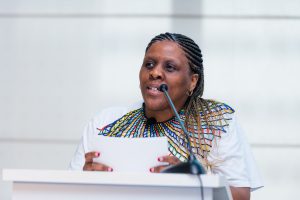Taking Local Action to Reach Global Goals
By Babalwa Mbono, one of m2m’s early clients and Mentor Mothers, now an m2m spokeswoman and trainer.

m2m Spokeswoman Babalwa Mbono
Last week I was in New York, joining with government leaders, civil society activists, and development experts to discuss the UN Sustainable Development Goals. This framework, agreed in 2015, guides the global development agenda and has been agreed to by all countries in the UN. These “Global Goals” include a goal to ensure healthy lives and promote well-being for everyone (SDG 3), including improvements in maternal and newborn health and action to combat HIV. These commitments are critical for saving lives and ensuring women can thrive. Yet, with sub-Saharan Africa facing the highest maternal and child mortality rates in the world and more than 250 children infected with HIV in the region each day, the question I would like everyone to ask is, how can we ensure they are achieved by their 2030 deadline?
It is here that the development community must understand that global goals around health can only be achieved through local action. As a health worker at the community level in South Africa, I understand the critical importance of ensuring that all women and their families—no matter where they live—can access the vital, lifesaving healthcare they need. This is why governments need to step up today and commit more funding for community health workers.
I understand the importance of this, because I needed this support in my own life in 2002 when I was pregnant with my second child and tested positive for HIV. What was meant to be one of the best days of my life turned into a devastating moment. I was terrified I would infect my innocent child. I was asking myself how this happened; I had all the questions and no answers.
All I knew then was that people in my country were dying like flies from HIV. The government was denying people access to treatment. My sister had died from Tuberculosis and HIV three years earlier and I thought I would soon follow her.
But I was lucky. I met a Mentor Mother employed by mothers2mothers (m2m), who reassured me and gave me hope. Mentor Mothers are HIV-positive women themselves, who are employed as peer mentors and frontline healthcare workers within communities. Through this peer support, I began to feel empowered for the first time in a long time, I could talk to them about my fears. I learned how to take my treatment and the importance of doing HIV tests for my baby. They also supported me to fight the stigma associated with HIV that was still so widespread in my community. I was able to disclose my status to my family and my husband.
Best of all, my beautiful baby girl was free from HIV.
After delivery, I became a Mentor Mother myself, working with women every day to help support their own health and that of their families, and prevent passing HIV onto their babies.
In this role as a community health worker I provided a critical lifeline to women and their families, ensuring that they get the health advice and medication they need. Community health workers like Mentor Mothers provide the world’s most promising health workforce resource for accelerating progress towards globally agreed health goals. Access to Mentor Mothers has helped drive the virtual elimination of mother-to-child transmission of HIV among women enrolled in our programmes.
Yet, despite the fact that community health workers play such a critical role, there is a huge gap in community health workers on the ground. The African Union have recognised the urgent need to train and deploy two million community health workers across Africa by 2020. So let’s stand together and call on governments across the world to pledge their support to employing more female community health workers, to support women through pregnancy and childbirth, and help prevent the transmission of HIV from mothers to babies.
It is through this local support that global health commitments can be met in practice. In addition, employing women as community health workers to support other mothers creates economic opportunities for women. At m2m, together with our partners, we employed nearly 3,000 HIV-positive women, who are often among society’s most marginalised, in 2017. Beyond meeting global health goals, this approach also supports the global goal for achieving gender equality (SDG 5) and empowers women with good, secure employment within their own communities.






















